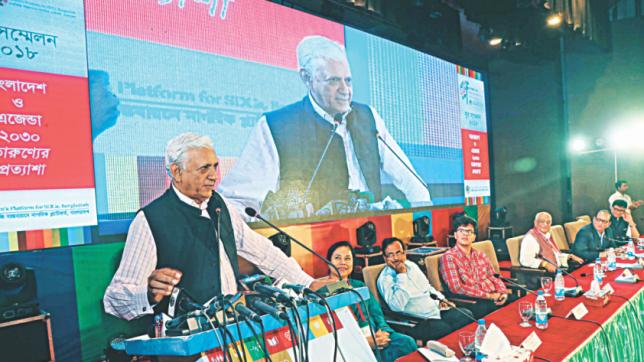SDGs not possible without youth uplift: experts

The Sustainable Development Goals will not be achieved without ensuring quality education and employment for the youth, experts said yesterday.
There is no doubt that the country is facing different challenges when it comes to the youth, said Gowher Rizvi, the prime minister's foreign affairs adviser.
“We have to resolve the problems of the young generation as they will play a crucial role in implementing the SDGs within 2030,” he said at the inaugural session of a conference titled “Youth Conference 2018 – Bangladesh and Agenda 2030: Aspiration of the Youth”.
Citizen's Platform for SDGs, Bangladesh organised the conference at the Krishibid Institution Bangladesh in Dhaka. This is a requirement to ensure balanced development.
In many cases, the potential of the youths remain unused, said Debapriya Bhattacharya, convener of the Citizen's Platform for SDGs.
One in 10 young people are unemployed; and one in three highly educated youths also cannot manage jobs, he said.
In fiscal 2016-17, the rate of unemployment among persons with education of up to tertiary level stood at 11.2 percent, up 9 percent from a year earlier, according to data from the Bangladesh Bureau of Statistics.
The society is yet to ensure the rights of youth, including providing quality education, he said.
Bhattacharya, also a distinguished fellow of the Centre for Policy Dialogue, said the political parties will have to address the rights of the youths in their respective election manifesto for the upcoming national polls.
The country's young voters now range from 4 crore to 5 crore.
After assuming power, the new government should implement the commitments made to the youths.
“The latest youth movements for quota reform in civil services, ensuring safe roads, withdrawing the VAT on education and the Shahbagh movement have inspired us,” he added.
The society would have to use the youths properly to ensure the country's prosperity, said Biren Sikder, state minister for youth and sports.
“We will become a developed country by 2041 based on the power of youth,” he added.
To successfully implement the SDGs, every person in the country need to be honourable citizens, said Sultana Kamal, core group member of the Citizen's Platform for SDGs.
“We should not tolerate any corruption,” said Kamal, also a human rights activist.
Among others, Sudipto Mukerjee, country director of UNDP in Bangladesh; Anisatul Fatema Yousuf, convenor of the Citizen's Platform for SDGs; Hanif Sanket, a popular TV host; and Sabina Khatun, captain of the Bangladesh national women's football team, also spoke.
In another session, discussants underscored the need for science-based education systems as it would ensure the required skilled manpower for industries.
The country does not need more commerce graduates at this moment; it requires science-based graduates and skilled manpower for managerial positions, said Syed Nasim Manzur, managing director of Apex Footwear.
Bangladesh has to pay $4.5 to $6 billion per year for hiring foreigners for managerial posts in different industries.
The youths can take over these positions if they groom themselves, he said while moderating a session styled “Bangladesh and Agenda 2030: expectation of youth”.
He suggested that the students study in physics, chemistry, mathematics and English to fulfil the demands of skilled manpower. Now, employers do not put much stress on a candidate's academic background; rather, they look at the skills and potential of the job seekers, he added.
Globally, efficiency is given preference over educational pedigree, said Khondaker Golam Moazzem, research director of the Centre for Policy Dialogue.
Students should look to gather skills and knowledge through the internet instead of wasting time on social media.
There is now a need to bring in massive changes to tertiary education to build skilled manpower, he added.
Youths should have the option of employment and entrepreneurship, said Bertha Gity Baroi, director of Caritas Bangladesh.
They should prepare themselves as per their aim in life from the beginning of their university life, she added.
Kaniz Fatema, president of Junior Chamber International, Dhaka North; and Banani Biswas, representative of Avizan, a non government organisation, spoke among others.
